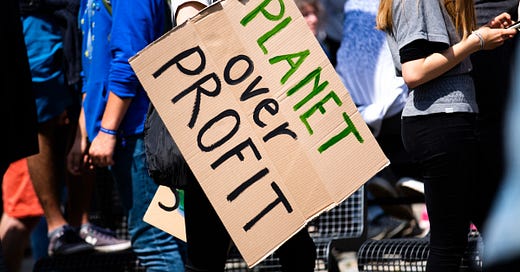Why My Generation's So Liberal
Gen-Zers don't think conservatives care. We have to prove that we do.
Almost everyone has heard the cynical political adage that “if you’re a conservative before 30 you have no heart, and if you’re a liberal after 30 you have no brain.” While the saying’s light-hearted at its core, it communicates a popular piece of political wisdom: as people get older, and buy into the social outlets that promote faith and family, they tend to support more conservative policies, presumably to conserve the institutions they’re part of and the social capital they’ve accrued. It’s an attractive one, and one that makes intuitive sense—obviously a single 21-year-old in an entry-level job is going to have different politics than a 40-year-old white collar worker with 2 kids, and American dynamism offers the kind of opportunity where you can be both in a lifetime.
Yet, is the conventional wisdom holding true for America’s youngest voters? It’s no secret that both Millennials and Generation Z overwhelmingly vote Democratic—and it’s a real liability for Republicans, who are slowly waking up to the reality that America’s soon-to-be-largest voting block hates them. The old adage would indicate that there’s a generational shift coming, and conservative activists would have you believe that the Millennial-GenZ voting block can be flipped Republican (while their activist organizations also insult GenZ as a bunch of kids who want free stuff). Yet, I’d posit that such optimism is only half-justified.
The growing social radicalism promoted by militant progressives, and the shaky-at-best economic track record from the current administration, is a liability that may eventually turn off younger voters, particularly those of the working class. And if that’s not enough, don’t forget that 71 percent of Americans believe the country is on the wrong track, a trend that’s more or less mirrored in young voters. A shift is coming, and this is the half-justification I’m talking about: the Millennial-GenZ voting block will likely turn away from the most extreme fringes of progressivism. This is a welcome change, and one that advocates of individual liberty and human flourishing should be pursuing and encouraging.
Here’s the hard part: it doesn’t mean they’re becoming conservative.
“Almost 7 in 10 Americans today say this country is not on the right track, we have to do something different,” then-AEI president and social scientist Arthur Brooks told audiences in 2014. “The problem is, they’re not all running to a new solution. Why? Because they don’t trust conservatives.” He gave that speech in 2014, and the numbers are the exact same as they are now. Could it be, in an era where less than two-fifths of Americans believe that Republicans are honest and ethical, that the problem is the same as well?
America’s youngest voters are operating on a position of deep dissatisfaction with American politics—this we know. In the short-term, it may serve to pull the Millennial-GenZ voting block away from the fringes of social progressivism. But in the long-term, it’s not catapulting these people into the arms of conservatives. It’s not enough to simply convince Millennials and GenZ that progressive answers won’t make them happier, healthier, or safer. We have to convince them that we actually have better answers that aren’t rooted in social regression or retribution. So how do we reach those young voters?
Be honest about the conservative stereotypes. Young people have learned a great deal of negative stereotypes about conservatives beyond the broad categories of unethical and dishonest: we don’t care about gun deaths, we’re anti-immigrant, we want women to die in back alley abortions, and a whole litany of other things. We cannot persuade generations that grew up being told about the evils of conservatism by simply ignoring those preconceptions. We have to do our homework and call out these ideas where they exist, because that’s what audience analysis is all about. We have to convince a generation who thinks we lack ethics and honesty that we care about that. That means we have to actually care about them—and care about them enough to engage with the blindspots in their worldview.
Read the rest of this piece at the Acton Institute here.




